Kōgo Noda
Nacimiento : 1893-11-19, Hakodate, Hokkaido Prefecture, Japan
Muerte : 1968-09-23
Historia
Kogo Noda was a Japanese screenwriter most famous for collaborating with Yasujirō Ozu on many of the director's films.

Original Film Writer
TV remake of Ozu's 'Late Spring'

Story
One day a company executive learns that his younger brother, whom he recommended, embezzled company funds. To save the situation he withdraws his life savings and gives money to his younger brother. He then suddenly disappears…
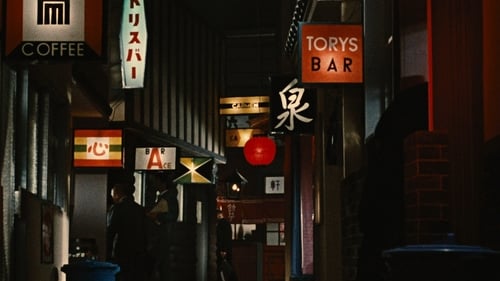
Screenplay
Shubei Hirayama es un viudo que vive con su hija de veinticuatro años. Sintiéndose viejo y acabado, el hombre se da cuenta de que ella debería vivir su vida y no tener la obligación de cuidarle permanentemente, así que decide casarla. Aunque su hija se resiste a abandonar a su progenitor, finalmente acabará haciéndolo. Shubei buscará en el licor del sake el refugio de la soledad, el consuelo de la angustia.

Screenplay
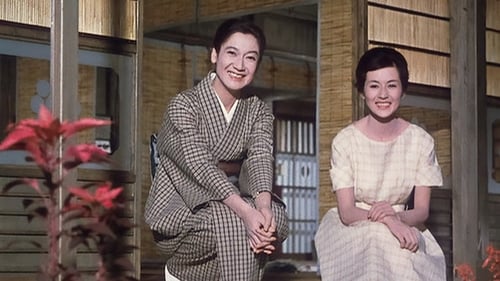
Screenplay
La familia Kohayagawa se prepara para casar a la joven Noriko, la hija pequeña, mientras que su hermana Akiko, viuda y con dos hijos, recibe una propuesta de matrimonio de un hombre con una buena posición económica. El viejo patriarca Banpei se comporta, sin embargo, de forma curiosa: decide ir a visitar a su antigua amante, Tsune, actitud que su hija Fumiko le reprocha. El viudo Banpei sufre un repentino ataque pero recobra la salud y su hija renuncia a juzgarle.

Screenplay
Tras la muerte de Miwa, sus mejores amigos deciden hacerse cargo del futuro de su viuda Akiko y de su hija Ayako. Todos creen que la mejor solución es casar a la joven, pero ésta rechaza uno tras otro a todos los candidatos que le presentan; así que deciden casar primero a la viuda.
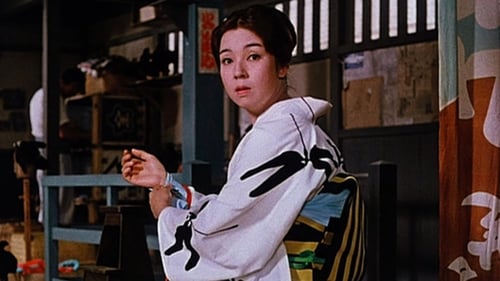
Screenplay
Remake de un film mudo dirigido por el propio Ozu en el año 1934. Narra la historia de un grupo de actores ambulantes que van a parar a una pequeña población de provincias. Allí el actor principal se reencuentra con una antigua amante y con un hijo ilegítimo.

Screenplay
Japón, años 50. Como todos los días, los miembros de una familia se disponen a afrontar sus problemas, sueños y realidades. El padre, con los altibajos de su trabajo y las exigencias que impone la educación de los hijos. La madre, administrando los ingresos familiares y atendiendo a las múltiples complicaciones de la vida doméstica. Y los hijos obsesionados por tener televisión en casa, y uno de ellos enfrascado en sus estudios y angustiado por un defecto físico.

Screenplay
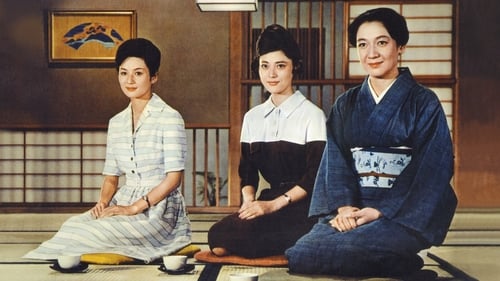
Screenplay
A un hombre de negocios sus amigos le piden constantemente consejos sobre el matrimonio, la vida conyugal y la vida familiar. Su serenidad y sus agudos análisis le permiten encontrar el consejo oportuno para cada situación. Sin embargo, cuando él mismo tiene que afrontar una delicada situación que afecta a su hija mayor, tropezará con grandes dificultades para encontrar una solución al conflicto.
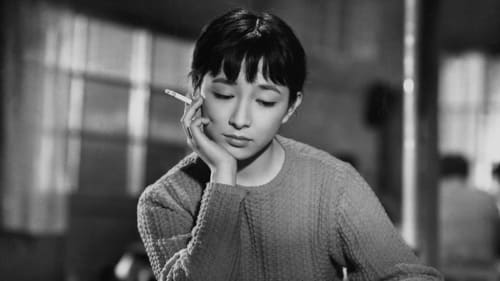
Screenplay
Dos hermanas viven con su padre: la más joven ha tenido una aventura y se ha quedado embarazada, la mayor ha abandonado a su marido y se ha refugiado con su hijo en la casa paterna. Cuando, de repente, reaparece su madre, a la que creían muerta, su estupor no tendrá límites. (FILMAFFINITY)
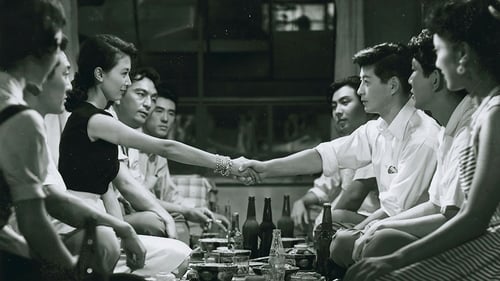
Screenplay
Un hombre casado de mediana edad, aburrido de la rutina cotidiana tanto en el trabajo como en su matrimonio, tiene una aventura amorosa con la hija de un colega suyo. Cuando su mujer descubre su infidelidad, tanto su vida como la de su familia quedarán completamente trastornadas.
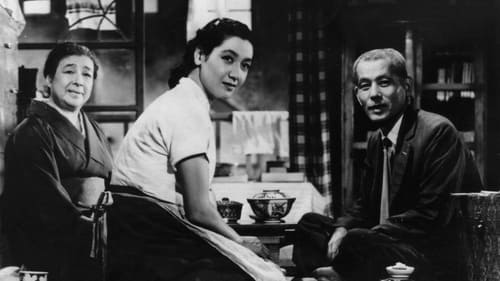
Screenplay
Una pareja de ancianos viaja a Tokio para visitar a sus hijos, pero ninguno de ellos tiene tiempo para atenderlos, por lo que deciden enviarlos a un balneario. Cuando regresan, la madre pasa una noche en la casa de una nuera, viuda de uno de sus hijos. A diferencia de sus cuñados, Noriko muestra afecto por sus suegros y conforta a la anciana.
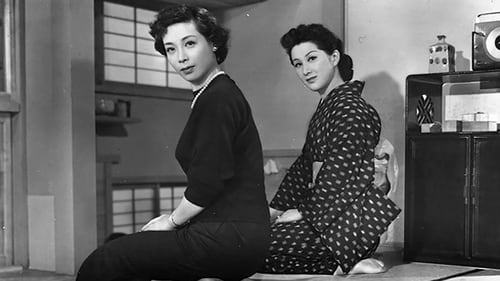
Screenplay
Takeo, una mujer caprichosa de la alta sociedad de Tokio, se aburre con su marido, un hombre tranquilo, que se ha educado en el campo, aunque ahora es ejecutivo de una empresa.
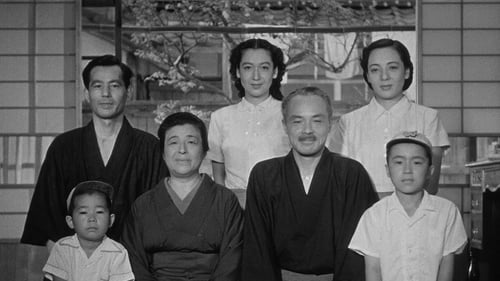
Screenplay
En el Tokio de la posguerra, los miembros de una familia convencional llevan una vida tranquila y serena. Su única preocupación es la soltería de Noriko, la hija mayor, que ya tiene 28 años. Pero la sociedad está cambiando, y Noriko, que trabaja y se divierte con sus amigas, no siente la menor necesidad de tener un marido. Sin embargo, su hermano considera muy imprudente la actitud independiente de la chica. (FILMAFFINITY)
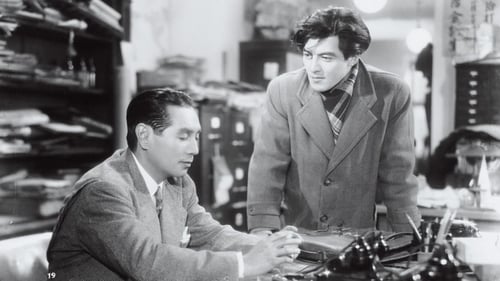
Screenplay
Two journalists and their lovers share an uncertain future.
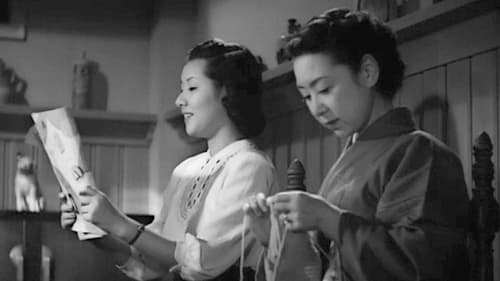
Screenplay
Setsuko se siente desgraciada al lado de su marido, un ingeniero alcohólico y sin trabajo. Ella estuvo siempre enamorada de Hiroshi, aunque nunca llegaron a prometerse, porque él emigró a Francia. Ahora, que ha regresado a Japón, la hermana de Setsuko intenta unirlos de nuevo. El único problema es que ella también está secretamente enamorada de él. (FILMAFFINITY)
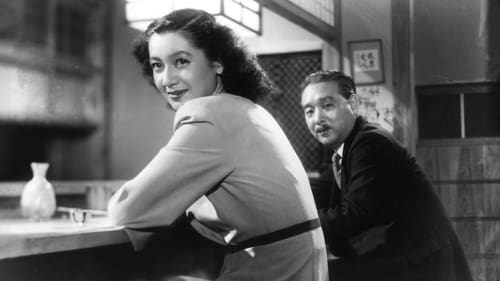
Screenplay
Somiya era un viudo viejo con una hija, Noriko, madura para el matrimonio, pero curiosamente sigue viviendo con su padre. Para hacerla cambiar de manera de pensar, Somiya finje tomar una esposa joven e intentar que su hija se de cuenta de su situación...
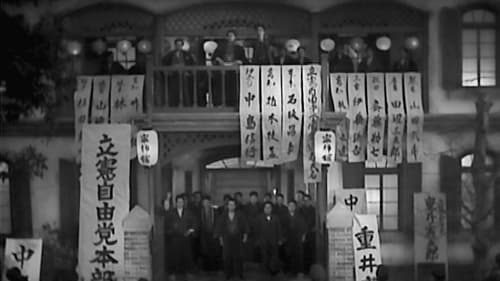
Novel
A woman's struggle for equality in Japan in the 1880s. Eiko Hirayama leaves Okayama for Tokyo, where she helps the fledgling Liberal Party and falls in love with its leader Kentaro Omoi, just as the party is being disbanded by the government.

Screenplay
A lawyer fights doggedly for a more just legal system to rid Japan of its draconian penal system.

Writer
Japanese propaganda film about the Normanton Incident.

Writer
Hiromasa Nomura World War II era film

Writer
In the movies of those times, you can see young boys in the company scene often. Those boys were called kyuji (給仕), which means “waiter” literally. They are doing odd jobs in the company including serving tea, ushering visitors, buying tobacco, etc. Ordering lunch for the individual requests was also an important job. Those boys were hired often as soon as they graduated from elementary school.

Screenplay
Following a young man through his childhood ambition to follow his father into the military to losing his life in combat in China.

Writer
This film was mainly shot in the Japanese skiing resort Hokkaido in 1937-38 and was intended to create support for the coming winter olympics of 1940 in Japan which however were cancelled because of the Japanese-Chinese war. A Japanese production, it was nevertheless made with German involvement in the form of skiing champion Sepp Rist and celebrated cinematographer Richard Angst (who also contributed to the script). Both had regularly worked with the inventor of the mountain film genre, Dr. Arnold Fanck, who had helmed the German-Japanese co-production "Die Tochter des Samurai", also shot by Angst, the year before. Angst apparently stayed in Japan until mid-1939 when he returned to Germany, carrying this film with him. Angst submitted it to the German censors later that year, but for reasons unknown to me it took three more years before the film was finally shown in Germany under the name "Das heilige Ziel" (The Holy Aim). (Karargara)

Writer
A young doctor, Kozo Tsumura, falls for young nurse Katsue Takaishi. But she's got a secret: she's a widow with a son. Kozo and Katsue decide to run away to Kyoto, but her child suddenly became sick and she just missed the train and Kozo. She makes it to Kyoto finally, but is unable to meet him. Plus she isn't accepted into Kyoto society. She goes back to her hometown and tries to forget him. She quits the hospital to concentrate on her singing. She makes her professional debut with the hit "Aizen Katsura". Kozo is in the audience.

Writer
A man and his girlfriend work for a cosmetics company, but would like to open their own store. The company is planning to send someone to Paris for special training and the man tries to get the general manager to send his girlfriend since this training would help them to start their own business. The general manager selects another woman and the trouble begins.

Screenplay
Three men fall in love with the same young girl who works in a tonkatsu restaurant in the Shitamachi district of Tokyo.

Screenplay
The eldest daughter of a noble family is in love with an aviator while being courted by a fellow aristocrat she thinks is a dullard. Told from the perspective of Ryota. In this second part, we learn that Akemi is pregnant...

Screenplay
The eldest daughter of a noble family is in love with an aviator while being courted by a fellow aristocrat she thinks is a dullard. This part is told from the perspective of Akemi.
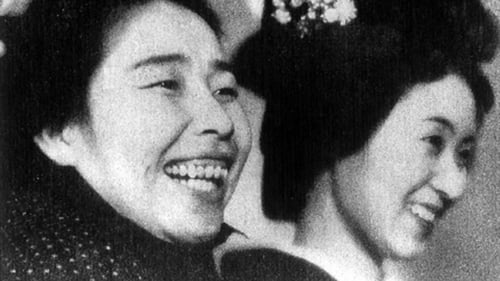
Writer
In a back alley of the Shitamachi district of Tokyo, Kihachi bears witness to a series of romantic complications involving the inhabitants of the neighborhood. Considered to be a lost film.

Screenplay
The film tells of the strained relationship between a mother and her two sons after the death of the family patriarch.

Writer
Ryoichi and Chikako, brother and sister, live together. Chikako toils during the day and, at night, prostitutes herself to fund his college tuition.
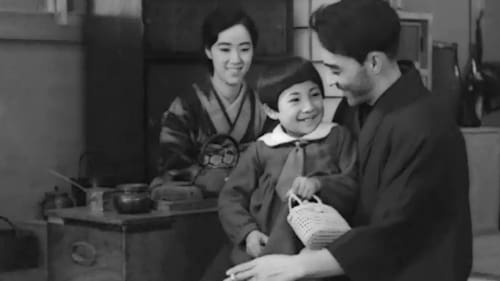
Writer
Shunsaku Atsumi, su madre Kishiyo, su aburrida esposa Masako su encantadora hijita Shingeko viven juntos en una confortable casa adquirida con los beneficios que les proporciona su boyante negocio de pescadería. No obstante, tan pintoresco cuadro no carece de trapos sucios. Nueve años antes, la verdadera madre de Shingeko, Tamae, dejó a Shunsaku y a su hija para marchar a Norteamérica. Un día, Shunsaku es acusado de un crimen, y Tamae regresa a casa convertida en una actriz de éxito en los Estados Unidos y reclama la custodia de su hija. Entretanto, en la empresa de Shunsaku, los trabajadores y la dirección se hallan enfrentados por motivos salariales. Tamae se ofrece para sacar a la compañía de sus apuros con su propio dinero, pero Shunsaku se niega en redondo. Shunsaku ingresa en prisión y la compañía se desliza hacia la quiebra...

Writer
A young man falls in love with a prostitute and is disowned by his family. He is then drafted, and heads off to war. Script exists - considered to be a lost film.

Screenplay
When a young man inherits his father's lucrative business, he cheats the system to set up three of his college friends with jobs.

Screenplay
Part two of Shimizu's major silent Seven Seas, a family drama of the intertwining fates of the rich, decadent Yagibashis and the far less prosperous Sone family.

Screenplay
The film is a lengthy work interweaving characters from different backgrounds and social strata in a narrative centered around the experiences of its heroine, Yumie Sone. Over two hours long, Seven Seas was released theatrically in two parts, with the first part entitled "Virginity Chapter" coming out in December 1931, while the second part, "Chastity Chapter," followed in March 1932. Near the beginning of the narrative, at a garden party given by the wealthy Yagibashi family in Tokyo, Yumie meets Takehiko, the Yagibashis' playboy son and the brother of Yumie's fiancé, Yuzuru. Yumie, a young middle-class woman, lives with her ailing father, a retired ministry official, an older sister, and a younger sister still a child (played by a very young Hideko Takamine). Takehiko, who has just returned from a trip to Europe, is attracted to Yumie and contrives to have her stay overnight at his family's mansion where he takes advantage of her.
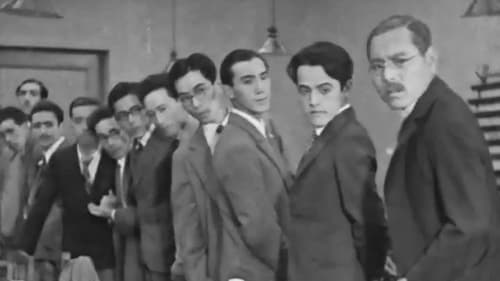
Screenplay
Mr. Omura, a teacher, leads a group of male students in an outdoor drill. One slight, comic young man, Shinji Okajima, has no shirt under his jacket; he scratches at fleas and makes faces behind Omura's back. Jump ahead several years, Shinji is married with three children. He sells insurance, and on the company's annual bonus day, he protests when an older worker is fired. Shinji loses his own job as a result, and he and his wife must find ways to cope. Lassitude, pride, the demands and needs of young children, and relationships from bygone school days all play a part in the outcome of their struggle.

Story
Mr. Omura, a teacher, leads a group of male students in an outdoor drill. One slight, comic young man, Shinji Okajima, has no shirt under his jacket; he scratches at fleas and makes faces behind Omura's back. Jump ahead several years, Shinji is married with three children. He sells insurance, and on the company's annual bonus day, he protests when an older worker is fired. Shinji loses his own job as a result, and he and his wife must find ways to cope. Lassitude, pride, the demands and needs of young children, and relationships from bygone school days all play a part in the outcome of their struggle.

Writer
A salaryman finds some money in the street and gets a reward for returning it to its rightful owner. However his colleagues immediately start borrowing money and selling him things he doesn't need, much to his wife's annoyance. Considered to be a lost film.

Writer
A young couple jump into the sea as part of a suicide pact. The man is rescued and subsequently discovers that his lover is also alive and working in a dance hall. Considered to be a lost film.

Writer
The film revolves around a desperate man who commits a crime in order to support his family, and the moral dilemma the policeman who tracks him down finds himself in.

Writer
A farmer’s boy, obsessed with his balsa-and-paper flying models and with dreams of real aircraft, develops a friendship with the daughter of the local squire, who introduces the lad to her pilot brother and his flying officer friends; through hard work, and despite the handicap of a lowly class status, he eventually succeeds in qualifying as a pilot and joining the air force.

Writer
Bored in his marriage, a dentist flirts with a young woman on a train. However he soon finds himself embroiled in a series of misunderstandings with his wife, the young woman and her husband. Considered to be a lost film.

Writer
When Sakamoto is made redundant he cannot bring himself to tell his wife. Instead he investigates other employment opportunities. Considered to be a lost film.

Screenplay
The remaining fragments of an early Ozu film. It is the simple story of two friends who live together in a poor tenement and who share about everything in life (food, hopes, work...). Everything goes well until they gallantly rescue a young (and pretty) woman injured in a road accident. Since the lady has nowhere to go, the two good-hearted friends invite her to their home. She soon becomes their housemaid and they soon begin to seek her favors. Alas, she falls for a young student she has met in the neighborhood, much to the two friends' dismay.

Screenplay

Writer
Early feature film by Hiroshi Shimizu.

Writer
Two criminal brothers try to go straight but face opposition from one of their criminal cohorts. Considered to be a lost film.








































